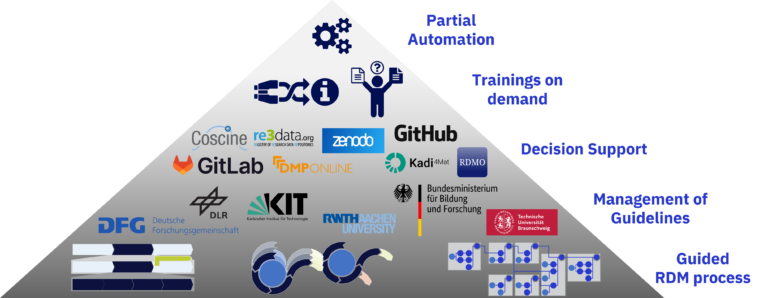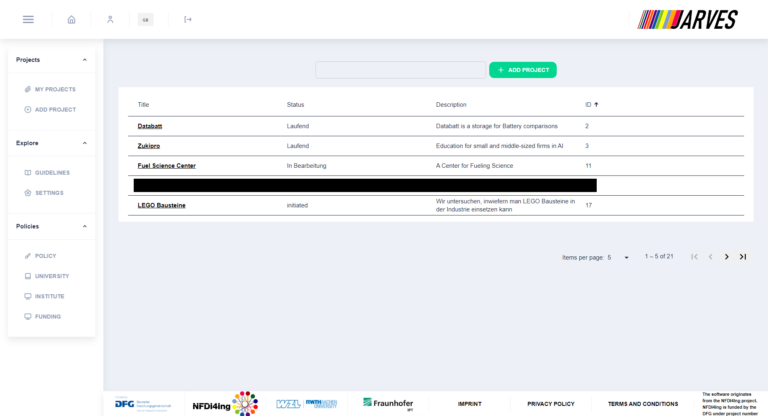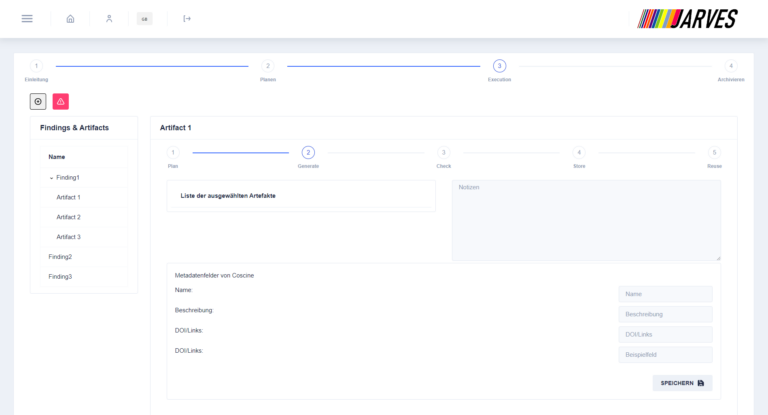Detailed description of the service
Jarves is a web-based tool to support researchers in their everyday RDM. It provides a guided process, that not only manages policies for research projects also supports decisions to be made based on these policies. Furthermore, Jarves provides training materials tailored for the exact step researchers are currently addressing in their specific project. Lastly, it provides a broad API connectivity, allowing for data exchange with other RDM tools and beyond.
By providing these five levels of support, Jarves facilitates the generation of FAIR-by-default data, ensuring the compliance of RDM policies and enriching FAIRness by filling gaps in RDM by showing possible solutions. Researchers no longer have to research on the how and what of RDM but can instead focus on their actual research in which Jarves accompanies them.
Guided RDM Process: Researchers should be supported not hindered by RDM. By resembling the research process, the RDM process of Jarves aims to adapt naturally into everyday research. Hence, the barrier of applying RDM is lowered.
Management of Policies: Still, RDM is dependent on many different factors such as demands by funding organizations or universities. These often have to be researched by researchers themselves, compared to one another and, most importantly, be understood. The last part is sometimes the most complex one, as policies are formulated as vague guidelines. Jarves takes care of this problem, gathering policies, translating them and providing researchers with an overview of their specific policies applying to their current project. Additionally, scientific supporting personnel has access to the policies stored in Jarves, allowing for creation and curation of policies by the community.
Decision Support: Depending on the applicable policies, Jarves takes the supporting of researchers one step further, recommending solutions for specific RDM-problems. This tailors the RDM process even more towards individual needs. Additionally, one glance is enough to understand, which tool should be used and why.
Trainings on Demand: One more challenge researchers are facing is the lack of knowledge about RDM, causing uncertainty, frustration or even fears. Jarves addresses this issue by providing trainings at the very point of need. There is no need to search for the exact training needed for a specific situation, as Jarves analyses the current state of the project and provides trainings for it. Many of thesr trainings are kindly provided by the NFDI4Ing Education Plattform!
Partial Automation: Synchronisation between different RDM-tools can be tedious. Entering the same information multiple times, does only mean additional effort and no benefit. Hence, Jarves creates projects in the other tools researchers have chosen for their research. While doing so, the functionality of other tools is not undermined. Jarves rather creates a hub for data exchange, reading and processing the information that was inserted into e.g. a DMP tool to enhance and checking the RDM for a project, pointing out possible improvements.
Please note: Jarves is still in an early stage of development. Hence, not all functionalities are implemented yet.
Terms of use & restrictions
Jarves is usable for everyone. The only requirement is an ORCiD to log in. However, it has to be noted that Jarves is currently in alpha phase. This means that on the one hand, the service is not scaled yet to handle extreme loads. On the other hand, while we try to maintain all data inserted into Jarves, we cannot fully guarantee that no data will be lost, as the platform is solely developed by researchers. Tables may be dropped.
Contact
Website:
https://nfdi4ing.pages.rwth-aachen.de/ta-frank/jarves/overview/
Mailinglist:
https://lists.tu-darmstadt.de/mailman/listinfo/nfdi4ing_jarves
Official contact:
jarves@nfdi4ing.tu-darmstadt.de
Tobias Hamann, tobias.hamann@wzl-iqs.rwth-aachen.de
References
publications that reference (or report on using) the service
Scientific articles:
A survey on the dissemination and usage of research data management and related tools in German engineering sciences – Preliminary study on the needs of researchers in the German engineering sciences
Matching Data Life Cycle and Research Processes in Engineering Sciences – A proposd new process for RDM accompanying engineering research as foundation for Jarves guided RDM process
Posters:
Jarves: CoRDI 2023 – The poster for the 1st NFDI CoRDI Conference (12.09.2023, eng)
Presentations:
Workflows ingenieurwissenschaftlicher Forschungsabläufe – Auszug des aktuellen Forschungsstands – A new approach to the data lifecycle proposed by NFDI4Ing Task Area Frank for Jarves (29.09.2022, ger)
Jarves: Der digitale FDM-Assistent – Presentation of Jarves on the “Offenes FDM-Netzwerktreffen: Digitale Unterstützung im FDM” of the RWTH Aachen University in context of the Love Data Week (15.02.2023, ger)
Jarves: The digital RDM assistant – Presentation of Jarves – Joint Assistant for Research in Versatile Engineering Sciences on the “RDA 20th Plenary Meeting – Gothenburg (Hybrid)” of the Research Data Alliance (10.03.2023, eng)
Jarves: The Digital Data Steward for Engineering Science Research – A presentation on Jarves on the NFDI4Ing conference 2023 (27.09.2023, eng)
Meet Jarves – The Joint Assistant for Research in Versatile Engineering Sciences – Presentation of Jarves on the “FDM-Werkstatt: Into the RDM Toolbox” of ForschungsdatenNRW (19.03.2024, eng)
Jarves, the digital data steward from NFDI4Ing – A presentation on Jarves on the 112th Bibliocon (05.06.2024, eng)
Jarves: More guidance and less effort in RDM – A presentation about Jarves on the NFDI4Ing Conference 2024 (18.09.2024, eng)
#WhyNFDI
To facilitate the documentation of research data, making engineering research more effective
Data is a crucial component for research and has to be managed. This applies especially in engineering, where digital data can automatically be recorded and analysed. However, to facilitate the processing of data, it has to be annotated with metadata. Furthermore, data often holds more information than needed for the primary use case, allowing for further analysis and future usage of said data. Yet, researchers struggle with the additional needed knowledge and effort connected to proper RDM. Jarves supports at this very point of need by providing an assisted process with decision support, making data generation and storage FAIR by default.
Miscellaneous
Website:
https://nfdi4ing.pages.rwth-aachen.de/ta-frank/jarves/overview/
Mailinglist:
https://lists.tu-darmstadt.de/mailman/listinfo/nfdi4ing_jarves



